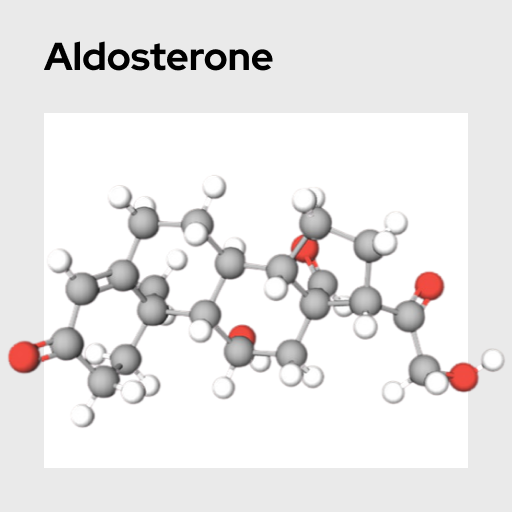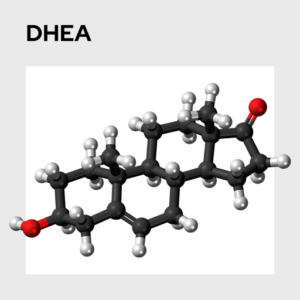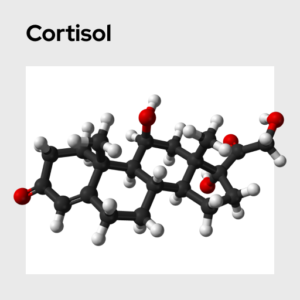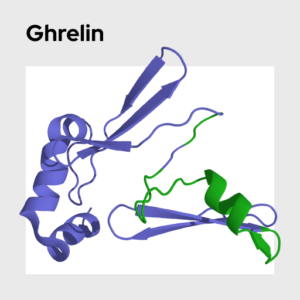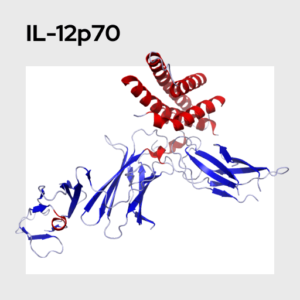Aldosterone
Aldosterone is an adrenal mineralcorticoid that regulates electrolyte balance and blood pressure. Levels of aldosterone typically increase in response to stress. Aldosterone plays a mechanistic role in the link between chronic stress and excessive inflammation.
Name: Aldosterone
Category: Stress
Type of Test: Blood + Saliva
Aldosterone (11β,21-Dihydroxy-3,20-dioxopregn-4-en-18-al) is a mineralcorticoid that is produced in the zona glomerulosa of the adrenal glands. Mineralocorticoids, such as aldosterone, primarily serve to regulate electrolyte and water balances. Through these pathways, aldosterone is also involved in the regulation of blood pressure. As with other steroid hormones, aldosterone is a derivative of cholesterol. Levels of aldosterone typically increase in response to stress and also serve as a marker of cardiovascular disease risk. Moreover, aldosterone appears to play a mechanistic role in the relationship between chronic stress and excessive inflammation.
As with other corticosteroids (e.g., cortisol), elevated levels of aldosterone may indicate prolonged hypothalamic-pituitary-adrenal (HPA) axis activation and have been linked to the psychological sequelae of chronic stress, such as depressive and anxiety disorders. Accordingly, aldosterone represents an important, albeit often overlooked, mediator of the relationship between stress and psychological functioning. In individuals with normal blood pressure, saliva and serum / plasma levels of aldosterone tend to be highly positively correlated.
Engler, L., Adolf, C., Heinrich, D. A., Brem, A.-K., Riester, A., Franke, A., … Künzel, H. (2019). Effects of chronically high levels of aldosterone on different cognitive dimensions: an investigation in patients with primary aldosteronism. Endocrine Connections, 8, 407–415. https://doi.org/10.1530/ec-19-0043 NOTE FOR ZSOLT – PLEASE HAVE ALL LINKS LINKED TO THE WORD “LINK”, WHICH YOU WILL HAVE FOLLOWING THE LISTED REFERENCE.
Gilbert, K. C., & Brown, N. J. (2010). Aldosterone and inflammation. Current Opinion in Endocrinology, Diabetes, and Obesity, 17, 199. https://www.ncbi.nlm.nih.gov/pmc/articles/PMC4079531/
Hlavacova, N., & Jezova, D. (2008). Chronic treatment with the mineralocorticoid hormone aldosterone results in increased anxiety-like behavior. Hormones and Behavior, 54, 90–97. https://doi.org/10.1016/j.yhbeh.2008.02.004
Kubzansky, L. D., & Adler, G. K. (2010). Aldosterone: A forgotten mediator of the relationship between psychological stress and heart disease. Neuroscience & Biobehavioral Reviews, 34, 80–86. https://doi.org/10.1016/j.neubiorev.2009.07.005
McMurray, E., Atkinson, B., Mullan, K., Cundick, J., Sheridan, B., & Bell, P. (2010). Salivary aldosterone is a useful marker of serum aldosterone in normotensive individuals. Endocrine Abstracts, 21, P346. https://www.endocrine-abstracts.org/ea/0021/ea0021p346


